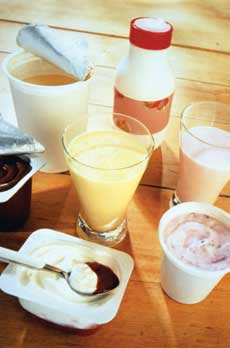
There is strong scientific evidence to suggest that diets rich in fiber can reduce the risk of coronary heart disease. In two recent human studies, carob fiber was shown to have a positive effect on human cholesterol levels, in particular, reducing LDL (low-density-lipoprotein, bad cholesterol) cholesterol levels, as well as improving the LDL/HDL (high-density-lipoprotein, good cholesterol) ratio. Unlike some other dietary fibers, carob fiber contains water-soluble and water-insoluble polyphenols, which exhibit considerable natural antioxidative activity and can contribute to a more favorable balance between free radicals (oxidants) and antioxidants.

Applications unlimited
Using a patented process, Nutrinova has created Caromax, an insoluble dietary fiber, which is derived from the pulp of the fruit of the carob tree,Ceratonia siliqua. This tree is typically found in the Mediterranean region, but also grows in Arizona, Australia and certain parts of Latin America. Caromax is obtained using a gentle extraction process in order not to impair the quality of any of the dietary fiber components that are important in the human diet.This unique dietary fiber has unlimited applications, including many types of bakery products, dairy foods and an array of functional food products. Due to its typical, natural brown color, carob fiber can intensify the color of certain food products and lends itself, in particular, to use in foods with flavors such as prune, winter fruits, coffee or mocha. It can be used for fiber enrichment or contribute to a more overall healthful image with its cholesterol-lowering properties and antioxidative potential. For the dairy sector, application has been successful in a number of different categories, including dairy drinks, yogurt and ice cream.
Consumer concern for health and well being is apparent in the number of fortified drinks in today’s marketplace that have functional properties and added health benefits. Carob fiber can be applied to such nutrition drinks in their liquid or powdered form. Application research shows that 3-5g of carob fiber can successfully be included in an 8-oz dairy drink with positive effects on color, flavor and mouthfeel. The fiber is added with other fortifying ingredients prior to pasteurization.
Low-fat, fiber-enriched yogurts with added health benefits have also seen a recent surge in popularity. Yogurts with fruit preparations can successfully make use of the ingredient as a fiber enricher. Carob fiber can be added to the yogurt via the fruit prep, or can be part of the white mass. To add powdered carob fiber to the white mass, simply include it with the addition of the other dry ingredients (sugar, pectin, stabilizers, etc.)
Carob fiber holds definite potential for manufacturers looking to balance the sweet taste and creamy texture of ice cream with the inclusion of a healthy ingredient. Because of its color, carob fiber is well suited in rum raisin, coffee and chocolate ice creams, so consumers can have the best of both worldsa rich, indulgent product with high-fiber content. Like yogurt, powdered carob fiber can be added to ice cream mix with the other dry ingredients.

